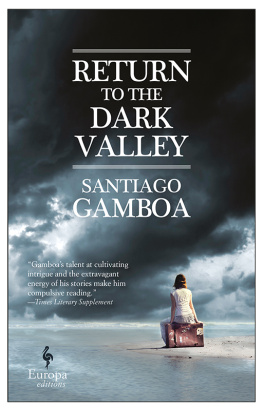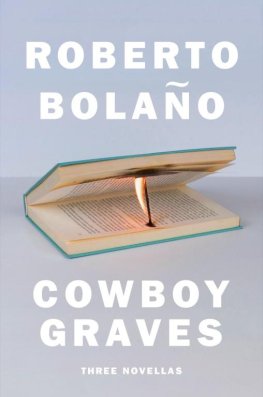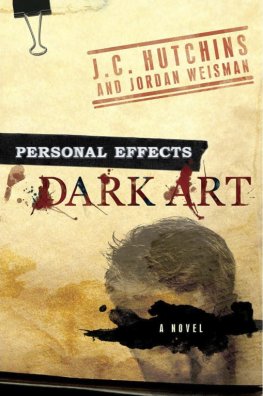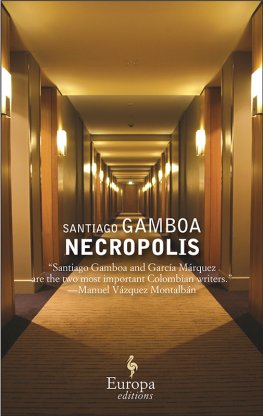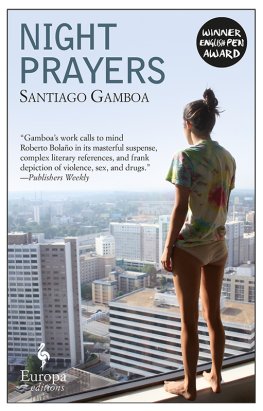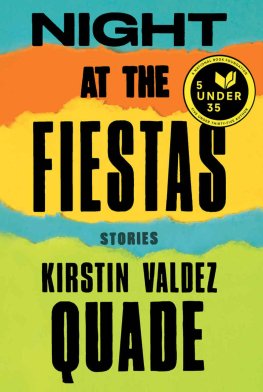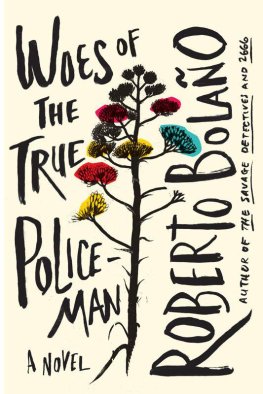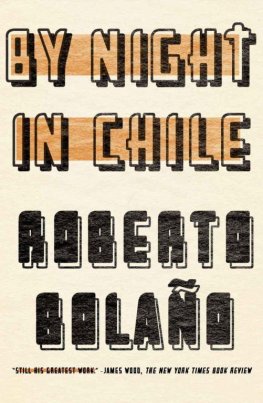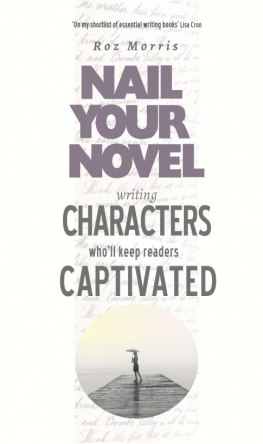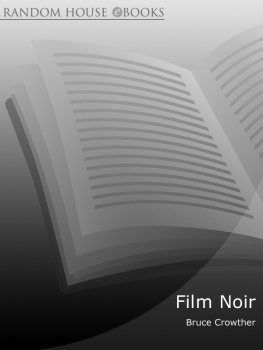ALSO BY
S ANTIAGO G AMBOA
Necropolis
Night Prayers
To Anala and Alejandro, riding to Golgonooza
That Man should labour & sorrow,
& learn & forget, & return
To the dark valley whence he came,
to begin his labours anew.
W ILLIAM B LAKE
Because even though the abyss swallowed them the song
continued in the air of the valley, the mist of the valley...
R OBERTO B OLAO
RETURN TO THE
DARK VALLEY
P ART I
T HEORY OF S UFFERING B ODIES
(OR F IGURES E MERGING
FROM THE W RECKAGE)
1
T hese were still the difficult years. I was very tired and wanted to write a book about cheerful, silent, active people. That was my intention. I had spent time in India, about two years, and when I got back to Italy I found everything had changed. Sadness was everywhere now. An unexpected storm cloud hovered in the skies of Europe, and nothing was the way it had been. From the doors of the old Roman buildings hung overlapping For Sale notices, a kind of collage that dramatized the anguish of owners having to leave or at least to withstand the blows. The highways and byways of the city swarmed with people who hid their eyes or looked at each other with guilty expressions.
Being there, just hanging about, with nothing specific to do on a working day, wasnt the best letter of introduction. Nor did it demonstrate much social usefulness. Especially if you spent the hours in some corner caf observing the transformation of the city and taking brief notes, making incoherent doodles, or drawing little men scaling mountains. Thats why it was best to change places frequently, in order not to attract attention and immediately be classified as a slacker or a piece of riffraff. When faced with a crisis, people are obsessed with respectability.
Its understandable. When masses of people seek work without the least hope of finding it, when businesses reduce their personnel and the fashion stores announce sales out of season, the best thing to do is become a man without a face. The Invisible Man, the Man of the Crowd.
I was that man. Always observing, attentive to the slightest vibration, perhaps waiting for something, with a cup of tea or coffee in my hand, letting myself be swept along by the frantic activity of the passersby, the way active humans come and go and fill squares and avenues, like shoals of fish driven by the tides. A movement that allows cities to go on living and produce wealth. To be healthy and respectable conurbations.
Exemplary conurbations.
This story begins the day my quiet life as an observer was shaken by a small earthquake. It was something very simple. I was sitting on a caf terrace on Corso Trieste, watching the stream of pedestrians pass by in the direction of the African quarter, when my cell phone vibrated on the table.
A new message, I told myself. An e-mail.
Please go to Madrid, Consul, to the Hotel de las Letras. Book into Room 711 and wait for me. Will be in touch. Juana.
That was the whole message, not a word more. Enough to unleash a modest storm inside me, like galleries collapsing. Juana. That apparently harmless combination of letters that had occupied my life for a brief time. My mouth still open, uttering her name. It had all happened some years before.
I looked at my watch, it was eleven in the morning. I reread the message and felt an even greater sense of sadness, as if a current of air or a tornado were lifting me from my chair, above the avenue and its tall pines. I had to hurry. To run.
Ill be there today, await instructions, I replied immediately, signaling to the waiter for my check.
Before long, I, too, was in movement, energetic and active, heading for the airport.
2
I t was drizzling, it was hot. Sitting in a Roman taxi, I watched Via Nomentana pass by, as far as Stazione Termini, then Merulana and, eventually, Cristoforo Colombo. The longest and perhaps most beautiful route to the airport.
Arrivederci Roma, I thoughtremembering an old songas I looked out at the beloved city. Something told me it would be a while before I returned, as the name Juana, with its incredible power of evocation, kept coming back, ever more distinctly, insistently, violently.
How long had it been? Seven years? Yes, seven years since Id met her, when I was a consul in India and had to deal with the case of her brother, who had been arrested in Bangkok. In all this time, I hadnt had any news of her or her son, even though I had written to consulates in many countries, who in turn had asked for information from the respective immigration authorities.
Juana Manrique. Pas dinformation lie ce nom.
That was the response from the French Ministry of Foreign Affairs in Paris, the last place from which Juana had been in touch with me. There were similar responses from a further twenty foreign ministries.
It was a mystery: a woman and a child who had vanished into the congested air of the world. One more disease of our dizzying era. I had never quite understood her during the few days I had spent with her in Delhi, which might have been why her image had come back to me frequently over the years, always in the form of a question: what strange things was she fleeing so stubbornly? When I finished my consular mission, I returned from Asia to my previous life, a life of writing and reading and watching. The same life I was now about to abandon because of a brief message from her.
The taxi made its way through the traffic jams of the EUR district until it reached the freeway leading to Fiumicino. Now I too was leaving, like that breathless multitude I had spent so much time observing and had always thought so remote from my own life.
Rome was struggling manfully to continue as an active, energetic city, but it wasnt an easy battle. A strange economic indicator called spread, which was not supposed to go above 300, was approaching 500. Greece and Spain had already broken through that limit and were close to ruin. The Italian news bulletins began with the daily spread figure flashing up on the screen, its rise referred to in anguished tones: 470!, 478! Terrified people raised their hands and exclaimed: What will become of us? Will we reach 500? The most absurd hypotheses were heard in the cafs. It was said that the Mafia wanted to bankrupt the country in order to remove it from the Eurozone and continue to exploit it free of the control of Brussels.
The newspaper La Repubblica reported that fifty-two entrepreneurs had committed suicide in less than a year. The Italian banks, setting a fine example of solidarity and compassion, preferred to capitalize their money in fixed-limit European funds instead of lending it to their long-term customers, thus preventing them from working. And the average business needs credit the way plants need light.
But the world crisis had first arrived in symbolic form, with a major shipwreck just off the Tuscan coast, opposite the island of Giglio. It was an omen of what was about to happen to the whole country, like some ancient oracle saying:
Something serious is coming. Run to your houses.
What exactly happened? A poor devil named Francesco Schettino, captain of a luxury cruise ship belonging to a company called Costa Crociere, thought to send a nautical greeting to the island of Giglio, something known in Italy as the bowa custom practiced by ships captains, consisting of passing very close to a harbor and sounding the sirenbut he got too close and hit a reef. It was the companys largest ship, with 1,500 double cabins, five swimming pools, a casino, discotheques and restaurants, a theatre on three floors, and 6000 square meters of gymnasiums and spa.
Like running a five-star hotel at high speed into a mountain of stones!

